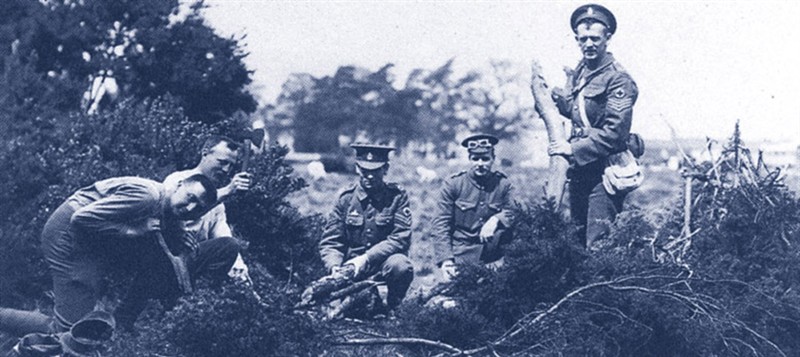One of the greatest myths about warfare is that, if dangerous, it is also terribly exciting. What it’s actually like for most that experience it: long periods of mind-numbing boredom interspersed with rare incidents of sheer terror. The trench warfare of the Western Front turned that formula on its head, with near constant artillery barrages creating a general state of terror followed by occasional (and often, inexplicable) brief periods of respite.
In early 1916, Ralph Vaughan Williams’ unit was shipped from the killing fields of the Western Europe, to Salonica, Greece on the Eastern Front, where the allied forces were fighting the nearly dissipated Ottoman Empire. At the start of World War I, the Ottoman Empire was known for many years as “the sick old man of Europe.” They absolutely pasted British and commonwealth forces at Gallipoli, but that was more about allied incompetence than Ottoman strength. For the most part, life on the Eastern Front was numbingly uneventful.
In Salonica, Williams was able to enjoy a bit of Greek culture, frequently watching and writing down folk songs and dances, but spent an otherwise cold and boring winter camped at the foot of Mount Olympus. The clock’s progress stalled. Williams spent his days in a draughty tent, huddling over improvised braziers made from empty food tins in an effort to keep warm. The camp was not, however, entirely devoid of spirit. In December, 1917, Williams managed to organize the singing of Christmas Carols, in the shadow of the towering home to the pagan Greek gods.

Vaughan Williams (extreme left) with Royal Army Medical Corps working party.
Just when Williams’ unit moved closer to the fighting, higher-ups in the British military decided a man of his upbringing and intellect was wasted in an ambulance unit. Williams, who had an egalitarian spirit and had become quite close to the men in his unit, was not happy with the news, but had no choice but to follow orders.
After a course of officer training, Williams was reposted to France, this time with the lengthy title of Second Lieutenant in the Royal Garrison Artillery in charge of transport and musical recreation in Rouen; a 27 syllable way of saying “hostler.”
When Williams was reposted to France, the Germans were shelling Paris with their long-range “Big Bertha” artillery guns. Within a matter of months the Allies pushed them back and many began to feel that the war was approaching a conclusion.
Williams wrote to Gustav Holst:
“The war has brought me strange jobs – can you imagine me in charge of 200 horses!! That’s my job at present – I was dumped down into it straight away, and before I had time to figure out which were horses and which were wagons I found myself in the middle of a retreat—as a matter of fact we had a very easy time over this—only one horse killed so we were lucky.”
“At present I am down near the sea undergoing a ‘gunnery course’ – more of a rest than anything else – but it’s given me an opportunity of learning something about my gun (among other things). Having been trained as a 6” Howitzer man I’ve been bunged into a 60 pounder!”
Following the unconditional surrender of Germany in November, 1918, an exhausted Ralph Vaughan Williams wrote to Holst (now in his own musical posting in Salonica):
“I am still out here – slowly trekking towards Germany, not a job I relish, either the journey or its object. I’ve seen Namur and Charleroi and was disappointed by both – every village we pass is hung with flags and triumphal arches...”
“...It’s a tiresome job watering and feeding horses in the dark before we start...then usually two or three wagons stick in the mud on the first start off and worry and delay ensues, and finally when one gets to one’s destination one has to set up one’s horse lines and find water and fill up nose bags etc. And if this has to be done in the dark it beggars description – so you see there’s not much music writing going on at present. But I’ve started a singing class and we are practicing Xmas carols and ‘Sweet and Low.’”
In February, 1919, Williams was officially appointed Director of Music to the First Army, in charge of education and musical activities. While the army slowly demobilized, Williams—enthusiastic by nature, especially with anything musical—threw himself into his duties. He left behind an orchestra and a handful of choirs by the time he returned home to England.
Williams was already a fairly renowned composer before the war; the public was familiar with his work. The problem was his experiences had reshaped him. He felt his former mode of composition no longer fit with the person that he had become. At the age of 47, undaunted, Williams took up the struggle to find a new way of expressing himself musically; a mode better suited and more true to the changed man who now controlled his pen.